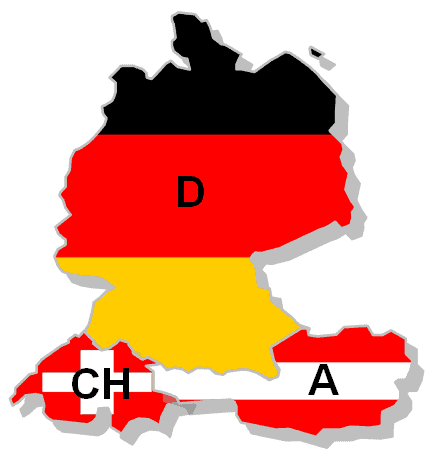Introduction
After the research of British business culture, I further my curiosity in another leading business region in Europe: DACH region. Fortunately, this time, I have a chance to collaborate with two Vietnamese young professionals who live and work in Germany. The first one is Tram Nguyen, a data analyst in the energy and EV charging industry. The second is Anh Luong, a new graduate Master student in Germany with the passion of market research. With their actual work & living experience in DACH’s market, the study of DACH region will be more insightful and extensive in 3 countries.
D-A-CH” is an acronym for 3 central Europe countries for Deutschland (Germany), Austria, and Confoederatio Helvetica (Switzerland) with the gross domestic product amounting to approximately 5.35 trillion US dollars in 2022. Germany is, by far, the largest one with around 83 million people, whereas Austria and Switzerland have just under 9 million inhabitants each. Three countries have shared traits in terms of culture, history and lifestyle. German is the most widely spoken language, followed by English (Statista, 2019). For these facts , since these three countries are geographically connected and have many economical similarities, professionals tend to treat them as a whole.
Following English market study, we want firstly to explore business culture and business etiquette of the DACH area, in particular the German market as the dominant consumption market with 80% population.
A. Business culture
As a part of Western business culture and business etiquette, DACH business shares similar business manners with British professionals such as discipline, planning, punctuality, high business ethic and work-life balance to some extent.
Firstly, planning and organisation
However, the planning and organisation is raised up to master level. Things are expected to happen at the specific time on a specific day. The German thinking process is extremely detailed, with each aspect of a project being examined in great detail. Careful planning, in one’s business and personal life, provides a sense of security. German do not like surprises or changes. even for better business performance improvement. Breaking the rules is unheard of in Germany.
Secondly, authority and hierarchy
German business culture places a strong emphasis on hierarchy and authority. It reflects the country’s values of orderliness, precision, and respect for authority. There are closely defined responsibilities and distinctions between roles and departments. The top of the company will normally the decision-maker. Subordinates are preferred to follow. This process, therefore, can be slow as feedback, discussion and permission are sought from a wide variety of authorities and specialists.
Thirdly, protocol & formality follows
German do not need personal relationship in order to do business as work and personal lives are rigidly divided. Following the established protocol and respecting the formality of the communication style are critical to build and maintain relationships in Germany. Any unethical behavior might seriously harm all future business negotiations.
Rhine model or social market economy is predominantly used not only in Germany but other western countries. The model targets long-term industrial strategy and is supposed to pursue stable capital investment with robust governance procedure, compared to Anglo-Saxon that focuses on capital growth in the short term. Thus, to some extent, it is said to be more fair, more efficient and more peaceful.
Lastly but important: business etiquette
Regardless social changes during pandemic and among younger generations, people in the DACH area widely accept professional business etiquette.
Punctuality
Punctuality is a cardinal rule in German business culture. Being late for a meeting or appointment is considered disrespectful and can tarnish a business relationship. Therefore, it is crucial to always be on time, if not early, for all business engagements.
Dress code
Both men and women are expected to dress professionally and conservatively at work. These reflect the German values of orderliness and precision. The typical dress code for men includes a dark suit, white shirt, and conservative tie, while women often wear a business suit or professional dress. However, this rule can be flexible, up to business sectors and business sizes. For instance, startups can accept more casual or smart dress code.
Communication & meeting
Germans value clear, direct, unambiguous communication, and strict observance of meeting and greeting protocols. They expect a great deal of written business communication, both to back up decisions and to maintain a record of discussions. German prefer fact-based discussions and appreciate straightforwardness in business dealings. In business practice, any form of ambiguity can lead to misunderstandings.
Personal relationship
is an advantage but on-the-job correspondence, structured email with salutations and greetings should not be forgotten. Respect for hierarchy is deeply ingrained in German business culture. It is important to address people by their proper titles and show deference to those in higher positions.
Balance between work and life
Work and personal life and personal lives are strictly divided. Germans follow the ideal that there is a proper time and place for every activity. After Feierabend, or closing time, it’s not seen as polite to keep talking about work. So if you’re networking after hours, be sure to invest in people personally, too. Do not expect to reach anyone in the office after 5 p.m Monday through Thursday and after 4pm on Fridays.
by Kate N.
—
Source: data accumulated from published studies & writers’ work & life experience
Santander Trade Germany: Business practices
Business culture.org – Business communication in Germany
Statista (2024) DACH countries – Statistics & Facts
